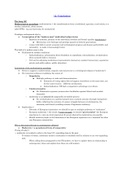12: Conclusion
The long 19C
Modernisation paradigm: modernisation = the transformation from a traditional, agrarian, rural society, to a
secular, industrial, urban society.
(after WW2 - esp one that’d also be secularised)
Paradigm underpinned also by
● A conception of the “modern man” (individual subjectivity)
○ Rejection of tradition, primacy of the individual, freedom and formal equality (meritocracy).
■ Meritocracy over heritage and prestige passed on between generations.
○ A man with faith in social, economic and technological progress and human perfectibility and
rationality - to make it increasingly better.
The birth of a modern man is also
● Facilitated by modern conditions
○ Industrialisation, urbanisation (from feudalism to capitalism), rationalisation, secularisation
(from accepted faith to reasons).
○ N-S and its adjoining institutions (representative democracy, modern bureaucracy, separation
private and public sphere, public education).
Limitations of the modernisation paradigm
● Seems to suggest a unidirectional, singular, natural process to a teleological endpoint (“modernity”).
● Yet, historical evidence invalidates the notion of:
○ Singularity
■ Multiple pathways to indn and democratisation.
● Extension of voting rights did not happen everywhere at teh same time, nor
for the same reasons. - different mechanisms.
● Industrialisation: UK had a comparative advantage over others.
○ Unidirectionality
■ Ex. Democratic regresses (conservative backlashes against liberal and socialist
demands).
○ (modernity as a) natural (& supposedly inevitable) process
■ Ex. secularisation as a political project (not a natural outcome of people losing their
faith), reflecting the outcome of a power struggle between revolutionaries, the
monarchy and church (rivalling notions of legitimate authority).
● Implications =
○ Diversity of European trajectories: we should be open to multiple pathways to “modernity”.
○ European modernity = the result of power struggle: we should “provincialise” the European
experience (i.e. just one local experience) & accept alternative modernities are possible.
○ Should sensitise people to the limitations of the European experience as a ‘standard’ for other
non-European communities.
Why is this point relevant to contemporary debates?
● Modernity = a paradoxical form of temporality
(“being of today”)
→ modernity is invoked to refer to the long 19C, something long in the past.
- To remain ‘of today’, modernity needs to constantly re-establish itself in relation to an ever-expanding
past.
- When calling ideas propagated in the FR modern, we have to update them in relationship to
contemporary times and explain how these are still modern.




